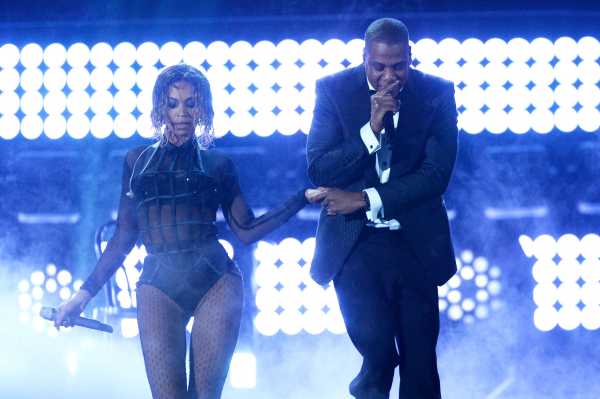
“No need to ask, you heard about us,” Beyoncé sings in her new joint album with husband Jay-Z, Everything Is Love. And it’s true, we have heard about them. We’ve heard about the intimate details of their marriage, the betrayals and the reconciliation. But that didn’t use to be the case.
For a long time, the question of Beyoncé and Jay-Z’s relationship was distinct from the question of their music. There were overlaps, but they were carefully contained, discrete. When one of them released a song about love and infidelity, we didn’t automatically assume they were singing about each other.
They might duet on a “Crazy in Love” here or a “Deja Vu” there, but when Beyoncé sent a man to the left, to the left in “Irreplaceable,” there was little public speculation over whether she was secretly singing about Jay-Z. She was clearly putting on a pop music persona, and few thought the song was autobiographical.
For years, their entire relationship was secret. They started dating in 2001 but didn’t go public until 2004, and they married in April 2008 and didn’t tell the public until that August.
Since then, slowly but surely, their marriage has crept into the conversation about their music. The couple’s last three albums have even formed a kind of marriage trilogy: 2016’s Lemonade saw Beyoncé accusing Jay-Z of adultery and then forgiving him, 2017’s 4:44 saw Jay-Z confessing and then begging for forgiveness to his sins, and 2018’s Everything In Love saw the couple overcoming their difficulties to triumphantly declare themselves “happily in love.”
When Jay-Z released his new album 4:44 last year, the narrative that dominated the headlines was that with this album, he was apologizing to Beyoncé for the infidelity she famously and repeatedly alluded to on her 2016 album Lemonade. And the couple just announced that they’ll be touring together this year in a reprise of 2014’s On the Run tour.
So how do we get from a relationship so private that it’s kept secret for years to a relationship so public that it’s at the center of both participants’ latest albums and tour? To understand how that transition happened, we have to look at how the gossip press covered the Knowles-Carter marriage — and how Beyoncé and Jay-Z responded.
In the early years of their relationship, Beyoncé and Jay-Z only rarely put each other in their songs
Public speculation that Beyoncé and Jay-Z were dating began in 2002, when they collaborated on “’03 Bonnie and Clyde.” The song was a natural fit for Jay-Z’s player persona, but Beyoncé’s hook, a lyrical inverse of Tupac Shakur’s “Me and My Girlfriend,” which the track samples, was so generic that it could have been sung by practically anyone. There was almost no reason to bring Beyoncé into the mix if you didn’t want the press to start speculating wildly.
Nevertheless, both parties played coy in the press, a practice they would continue throughout their relationship.
“I never talk about my relationships,” Beyoncé told Essence in 2005. “I only talk about them in my songwriting; otherwise things get too messy.”
“I just think it’s really a part of your life that you gotta keep to yourself,” Jay-Z told Vibe in 2008, when asked why he’d kept his marriage to Beyoncé a secret. He added, “I shared so much of my life, my childhood, and my family, the death of my nephew with the world. I should have something to hold on to.”
It’s a revealing pair of quotes. Beyoncé, who is so wary of the press that she very rarely gives interviews, likes to keep the narrative about her relationships under her control: She decides how much to bring into her songs, and when, and how. Jay-Z, who tends to the personal in his songwriting, seems to prefer to keep his relationship entirely out of his public life: out of the press, and out of his songs. He claims to want to control the narrative by not giving out any access to it at all.
For the first few years of their relationship, the Carters followed the model Jay-Z laid out. While they were constantly photographed together, and their relationship was a fundamental part of their celebrity, it wasn’t something they used in their art. They spoke about each other in interviews rarely, and with the exception of a few collaborations and a tossed-off line here and there, they generally didn’t feature as characters in each other’s songs.
In her music, Beyoncé was an irresistible queen who was better than any man who might dare to approach her; in his music, Jay-Z was a carefree player. Their relationship and subsequent marriage didn’t match their musical personas, so they put it aside.
When the Carters started to put an idealized, aspirational version of their romance in their songs, the gossip industry began to build a darker narrative around them
But in 2013, following the 2012 birth of Blue Ivy, things began to change. The Carters began to integrate their marriage into their musical personas. Beyoncé launched the Mrs. Carter Show world tour, explicitly making her marriage a central part of her musical persona. When she released Beyoncé later that year, Jay-Z was a major part of the story of the album.
“It takes me back to when me and my husband first meet,” Beyoncé said of “Partition,” “and he tries to scoop me and he thinks I’m the hottest thing in the world.” Jay-Z had a cameo in the video, in what director Jake Nava said was an attempt to “create and capture a bit of genuine intimacy” between husband and wife.
The two collaborated on Jay-Z’s “Part II (On the Run)” — a de facto sequel to “’03 Bonnie & Clyde” in which Beyoncé is now a full lyrical participant and character — and in 2014, they set off on a joint On the Run tour. The “On the Run” message is a tricky little paradox: It treats Jay-Z and Beyoncé as fugitives on the run from their own fame, creating a sanctuary through their romance, even as the actual Jay-Z and Beyoncé assiduously courted fame and recognition, and used their marriage as a particularly effective tool for reaching it.
“This is real life!” Jay-Z crowed during a live performance of “Part II” on the last night of the tour, prompting Beyoncé to drop her mic and mouth, “You made me laugh,” in mock rebuke. The moment rapidly went viral. “Too cute,” fans commented on the video.
It was an idealized, aspirational moment. They were selling a fantasy: Imagine being rich, famous, widely regarded as the best in the world at what you do, and being crazy in love with someone who checks all of those boxes and is just as in love with you.
But just as the Carter marriage was becoming a particularly effective tool in both members’ musical arsenals, the story of their marriage spiraled out of their control.
A month before the On the Run tour launched, in May 2014, Beyoncé’s sister Solange got into a fight with Jay-Z in the elevator following a Met Gala afterparty. The whole thing was caught on security cameras, and TMZ got hold of the footage and published it.
Related
Who is Solange? And why is she attacking Jay Z?
Everyone involved kept quiet about the incident, but rumors rapidly circulated that Jay-Z had cheated, Solange knew it, and she was defending her big sister’s honor.
So as the Carters spent every night singing about how deeply they loved each other in front of adoring fans, divorce rumors swirled around them. One widely circulated blind item suggested that their marriage had always been a business arrangement, and Page Six wrote that “they are business people first, entertainers second. Husband and wife comes somewhere down the line.” Only “divine intervention” could save their marriage, another article concluded.
Almost as soon as the Carters began to integrate the story of their marriage into their music, the gossip industry took control of the narrative, and things got, as Beyoncé predicted back in 2005, “messy.” Beyoncé and Jay-Z both came out of it looking like shrewd, calculating liars. Their marriage stopped being good for their brands and started to hurt them instead. So Beyoncé took over the story, and she did it with her most potent weapon: her music.
Putting the most private aspects of their marriage into their music gave the Carters control again
During the On the Run tour, Beyoncé began obliquely referencing rumors of Jay-Z’s infidelity onstage. Performing her 2006 song “Resentment” — allegedly written about Jay-Z’s affair with Rihanna, although Beyoncé has always denied it — she tweaked the lyrics so that they appeared to apply more clearly to her current relationship with Jay-Z. “Been ridin’ with you for six years” became “Been ridin’ with you for 12 years.” The crowd at the On the Run tour went nuts.
And in 2016, Beyoncé released Lemonade. Lemonade tells the story of a woman whose husband betrays her, but whom she eventually, magnanimously forgives; in the accompanying visual album, the reconciliation songs are interspersed with soft-toned footage of Beyoncé and Jay-Z sweetly cuddling. “It could be about anyone’s marriage,” Beyoncé’s mother said, but the implication that the album was on at least one level specifically about the Carter marriage was hard to avoid.
The marriage that Lemonade depicted was fraught with betrayal and heartache and doubt — but it was anything but a business arrangement. Watching Beyoncé whisper, “Are you cheating on me?” it felt impossible to doubt that she was truly in love with her husband, and that what he’d done to her had been genuinely painful.
Addressing the infidelity rumors in her music gave Beyoncé control of the narrative again, and the story she spun was immensely compelling. She was no longer a cold-blooded businesswoman ruthlessly exploiting her marriage for professional gain and ready to escape as soon as it was convenient for her. No, now she was a regular woman, “not too perfect / to ever feel this worthless,” and her husband had callously hurt her.
Almost immediately, the narrative that the Carter marriage was a business arrangement slunk back into the darkest corners of the gossip industry. Lemonade convinced almost everyone that Beyoncé and Jay-Z were genuinely in love, and it also convinced almost everyone that Jay-Z had genuinely fucked up.
With 4:44 and the new collaboration Everything Is Love, Jay-Z followed the model set by Beyoncé, one they’re now taking on tour: As long as the Carters are singing about their relationship and its problems, we believe in them. We root for their marriage to succeed. We follow the revelations contained in every song breathlessly. We don’t accuse them of lying to us. Jay-Z may have had to apologize profusely to both Beyoncé and the rest of the world in 4:44, but at least the world believed in the marriage he was apologizing about.
When they turned the darker and more private aspects of their marriage into the subject of their music — a move they had steadfastly avoided for 15 years — Beyoncé and Jay-Z managed to kill the rumor that they were nothing but cold-hearted businesspeople in a marriage of convenience. And ironically, that turned out to be a fantastic business decision.
Update: This article was originally published in 2017 on the release of 4:44. It has been updated on the announcement of the On the Run Part II tour and the release of Everything Is Love.
Sourse: vox.com






